Office Distractions Explained: Types, Causes, and Solutions
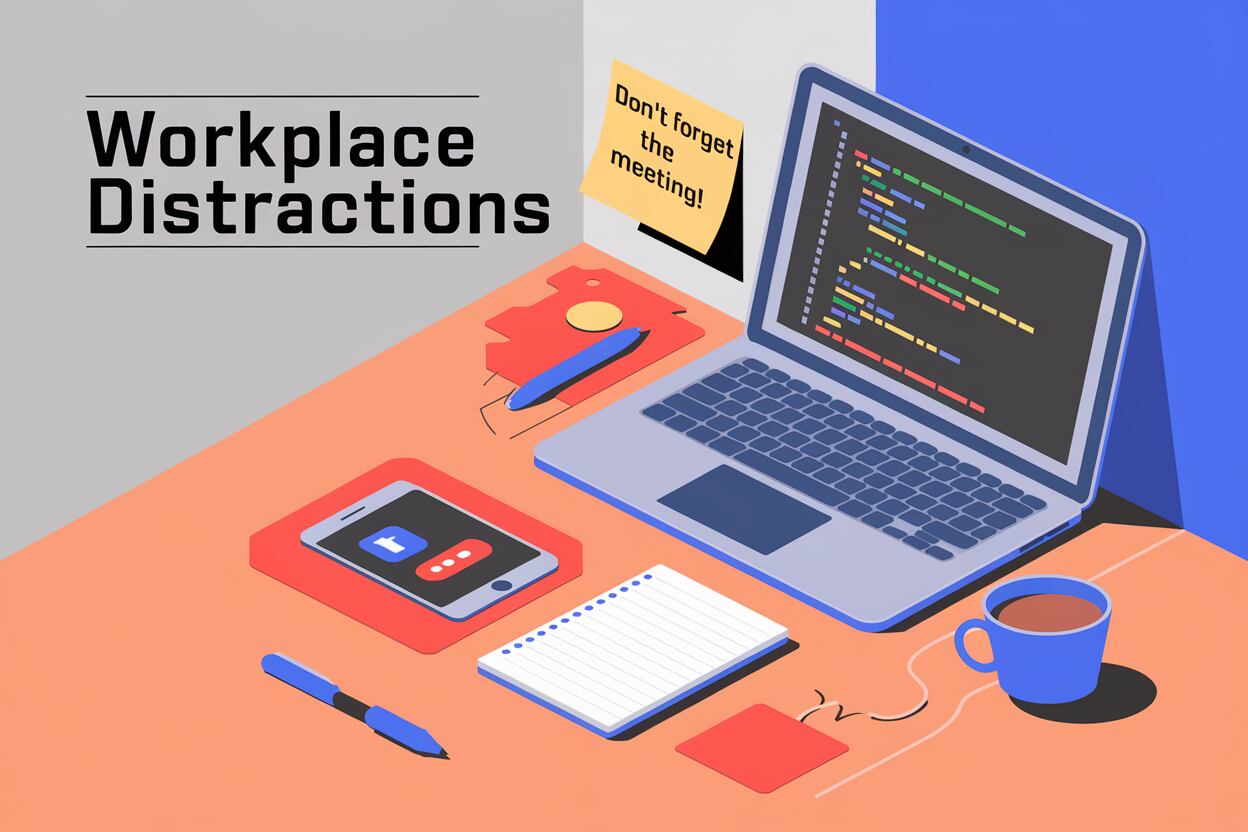
Quick Summary
-
Find out what’s stealing your focus, like constant emails, cluttered desks, or noisy coworkers.
-
Distractions make it hard to work and leave you feeling stressed.
-
Try simple tips like tidying up, muting notifications, and setting clear work hours to stay on track.
Have you ever left the office feeling busy all day but can't perform as expected? Though you've started your day powering up your mind, a notification alert, or a call makes your productivity lose.
Or else chatty coworkers stop for a "short talk." Before you know it, an hour has slipped away.
Sounds close? You're not alone.
Office distractions are stealth productivity killers that chip away at your focus without noticing. Now, it's high time we find the causes of distraction.
This guide will explore the common workplace distractions and how they quietly sabotage work efficiency. And most importantly, I’ll explain how to overcome them by:
- Optimizing the work environment
- Set clear workplace policies
- Digital distraction management
- Encourage healthy work habits
Common Distractions in the Workplace
Different types of distractions may occur at work. However, one thing that remains common is their impact on time management and productivity.
But, once you know what's draining your energy and attention, you can work on dealing with distractions.
Here are some distractions that we usually see in the office:
Digital Distractions (Emails, Notifications, Social Media, etc.)
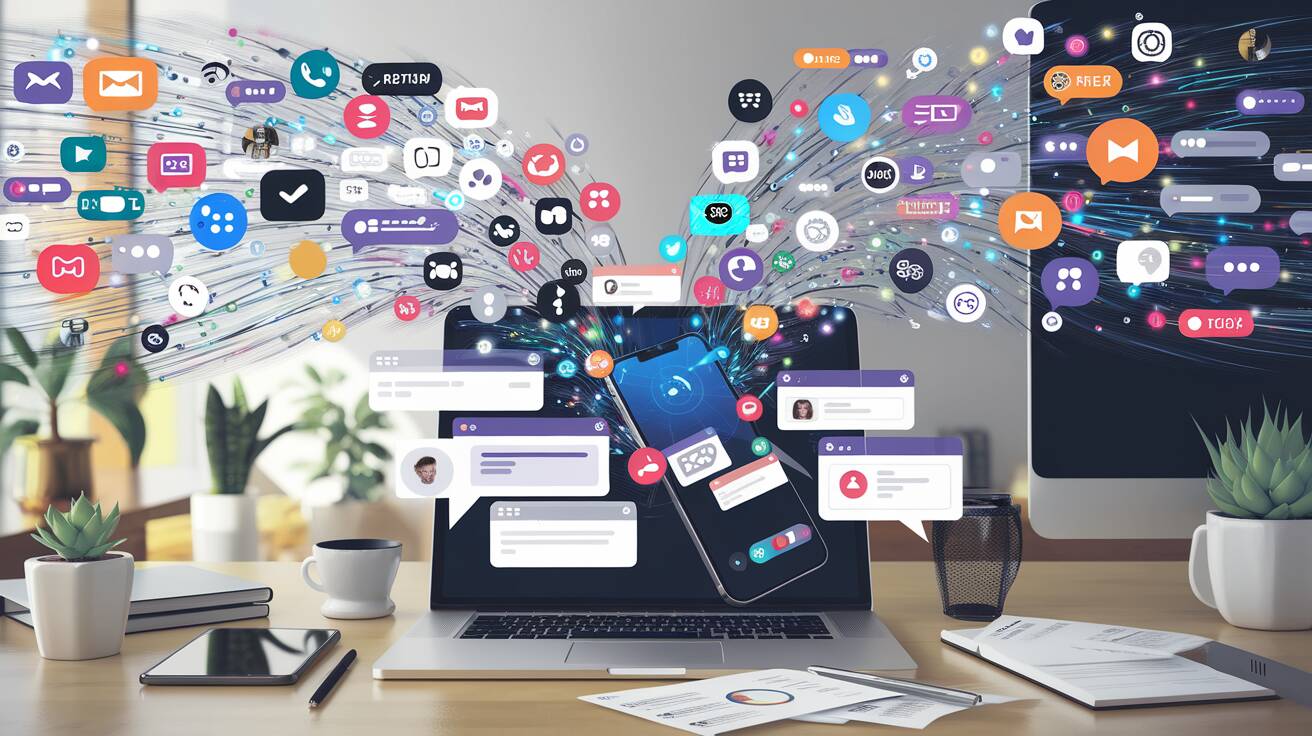
Digital and technological distractions in the workplace constantly pull our attention away from our tasks.
According to the HBR statistics in 2022, workers waste a lot of time switching between apps and websites while doing their jobs, around 1,200 times a day. The digital distractions include:
We've all been there. As you progress on a task, your inbox fills with new emails. Whether it's personal, work-related, or spam, the barrage of new messages can distract you. It's tempting to check every email as it arrives, but that habit can make you spend more time task-switching than finishing any of them.
Social Media
Using social media during the short break takes a lot more time. A quick scroll or checking the notifications may take a few minutes, but it can extend to more minutes. It doesn't seem harmful, but that little distraction can add up, stealing precious time that could be spent on more productive pursuits.
Phones
How often have you picked up your phone "just to check something" and suddenly found yourself deep in a rabbit hole? Whether scrolling through social media, responding to a text, or checking the news, the cell phone's constant interruptions break your focus.
Physical Distractions
Physical distractions occur within your workspace or body. They can be harder to control but add your office distractions.
Cluttered Workspace
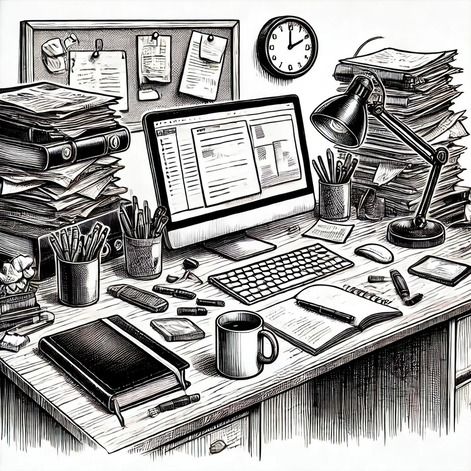
Your brain gets overwhelmed when your workspace is cluttered with papers, empty coffee cups, or random items. A disorganized space can make it harder to think clearly and increase stress.
Clutter (General)
Clutter doesn't have to be on your desk. It could be the mess in the office kitchen or the stacks of papers. Clutters can act as stress triggers and increase task fatigue.
Hunger
Have you ever tried to focus on an empty stomach? It's close to impossible. Hunger distracts you from your work because it makes you tired and irritable. It's one of those physical distractions that can be solved easily but often needs to be noticed when it's too late.
Mental & Emotional Distractions
These distractions do not come from outside but from within one's mind and emotional state. Maintaining mental health at work is vital to limit distractions.
Anxiety
Frustration at work, personal worries, or looming deadlines can cause anxiety. When you are in tension, it becomes more challenging to concentrate on the task at hand. Anxiety pulls your attention away, leaving you feeling overwhelmed and distracted.
Unnecessary Meetings
Unscheduled meetings can lead to burnout, which results in emotional fatigue. This fatigue makes it harder to concentrate on your job after returning to your desk.
Multitasking
Multitasking seems a great way to get more done, but it reduces productivity. Trying to juggle multiple tasks at once can make concentrating harder and lead to more mistakes.
Social & Interpersonal Distractions
Sometimes, distractions come from the people around us. These social interruptions can be more subtle but just as disruptive.
Coworker interruptions
Interrupting colleagues is often a source of unexpected distraction. Whether that "quick question" turns into a half-hour discussion. Or to say hi, coworkers will break into your focus.
While developing good relations is crucial in a workplace for positive ambiance, these can disturb deep work.
Office Gossip
Gossip is often very tempting. It's just human nature to want to know what's going on behind the scenes, but quickly, your focus can be entirely derailed by engaging in gossip at the office. Gossip is easy to get caught up in, but it won't help you do your job.
Gossip (General)
Gossip isn't restricted to work matters. Rather, it can be about personal lives, rumors, or anything else. Even though it may seem harmless, it can distract you from the task at hand and affect team dynamics over time.
Chatty Co-workers Nearby
Sometimes, it's not the volume that's the issue; it's the content. When your coworkers talk about something that has nothing to do with your work, it can easily pull you out of your headspace. And even if you try not to listen, your brain still registers the conversation in the background, breaking your concentration.
Interruptions (Unscheduled Chats)
People often don't realize that when they drop by your desk for an impromptu chat, they are disrupting your flow. These might be minor interruptions, but they break your flow and may hamper your focus on the tasks.
Workplace Politics
Have you ever been in the net of office politics? It is quite tiresome and distracting because, instead of being focused on your task, you might be stressed out playing the "office game". This can create a feeling of distrust, where collaboration becomes increasingly more difficult. It results in burnout and affects employee productivity.
Noise & Environmental Distractions
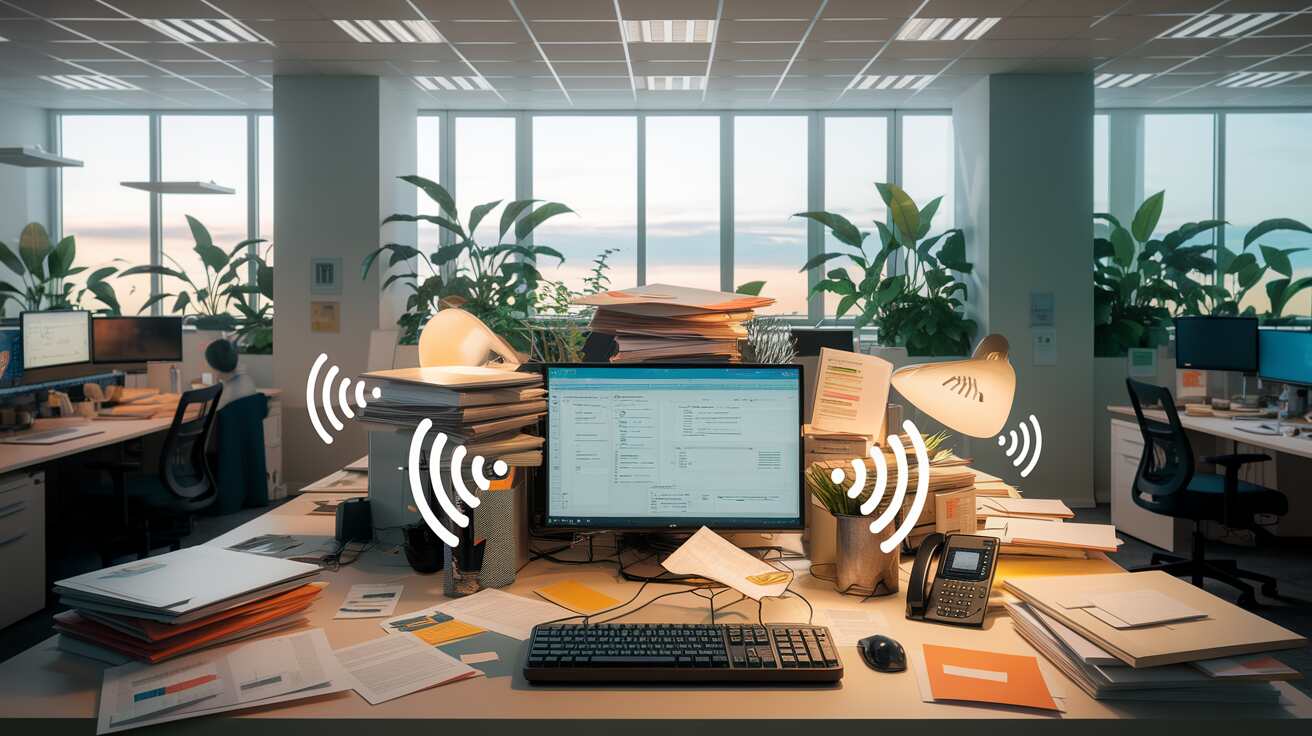
You can't help but deny the noise around you. This affects your work environment and quickly pulls you out of a focused state.
Background Noise
Noise is one of the most common complaints about open offices. While for some people, this noisy environment is a productive haven, for others, it is just plain interruption. Constant background noise makes concentration harder, and exhausting.
Environment
A work environment can be distracting for many reasons. It can be too hot, cold, cluttered, or simply disorganized. You can't match the office environment, whether the temperature or the mess around you. Sometimes, it hampers people if there is not enough natural light and fresh air or dull paint.
People Typing Loudly
We are all guilty of typing a little louder when deep into a task, but it's hard to ignore someone in the office typing at full volume. Constant click-clack can be an irritant that will chip away at your focus little by little, especially if it is all day.
Noisy Co-workers
We've all had that coworker who doesn’t notice how loud their voice is. Whether on the phone, in conversations, or during meetings, their volume can significantly disrupt your workflow. Even the most well-intentioned coworkers can unknowingly be the loud talkers who contribute to your distraction by talking loudly or engaging in side conversations.
Remote Office Distractions
Many agencies, small businesses, or even large enterprises run hybrid workplaces. It's necessary to mention all the office interruptions that occurred in remote work.
Device Incompatibility and Tech Glitches
Incompatibility with the device is one of the biggest productivity killers when working remotely.
Most remote workers use personal devices like laptops, tablets, or smartphones, which may need to sync properly with their company's work systems or software.
Also, communication overload-related glitches can cause unexpected distractions.
Misaligned Schedule
One of the most challenging aspects of working remotely is dealing with misaligned schedules because team members work in different time zones. This often means adjusting your routine, such as working early in the morning, late evening, or even on weekends.
This time zone gap can disrupt your sleep, throw off your schedule, and make it challenging to stay productive.
Blurred Boundaries Between Work and Personal Life
Working from home or in a remote office blurs the line between your professional and personal life, making it difficult to separate the two. This lack of separation can make it hard to "switch off," leading to longer work hours, reduced downtime, and increased stress.
How to Minimize Office Distractions
Office distractions can make one less productive, stressed, and reduce job satisfaction.
Fortunately, there are actionable strategies for businesses and employees. These tricks reduce distractions and help better focus on work productivity. Here's how:
Optimize the Work Environment
Get Your Workspace Ready
It's important to consider your office space design according to your test. Maintaining the workspace ergonomics with the right setup, tools, and lighting can improve your focus.
Reduce Distractions
Clear unnecessary items from your workspace regularly to avoid a chaotic environment. Keep gadgets such as tablets, game consoles, or personal phones away. Store non-work-related items out of sight to maintain a professional atmosphere.
Seek Distraction-Free Workspace
The office should be designed in such a way that employees’ workspace can eliminate the background noise. Implement some noise-canceling solutions like headphones, hearing protection, sound-absorbing materials, etc.
Set Clear Workplace Policies
Set Boundaries
Establish and communicate your work hours to colleagues, clients, and family. Utilize online statuses such as "Away" or "Do Not Disturb" in communication platforms like Slack or Teams.
Scheduled Meetings Only
Schedule meetings only when it’s necessary. Avoid impromptu calls. Set clear agendas before meetings to stay on topic. Establish meeting-free days to allow employees uninterrupted focus time. Limit meetings to 30-45 minutes to avoid time waste.
Batch Your Communication Time
Designate time slots to respond to emails, messages, and calls at specific times. Let coworkers know you'll respond within set periods to avoid constant interruptions. Use calendar blocks to avoid scheduling overlaps.
Learn Time Management
Start daily with a to-do list prioritizing high-impact tasks. Set weekly and monthly goals to keep track of long-term projects. Conduct regular time audits and evaluate productivity patterns. You can use the Pomodoro technique and apps for focus work.
Digital Distraction Management
Website and App Blockers
These tools prevent access to distracting websites and apps, ensuring you stay focused during work hours. Some apps like Freedom, StayFocusd, Cold Turkey, etc. are notable.
These tools track your working hours spent on several projects and tasks during office hours. Some tools can monitor your computer, apps, and websites.
For example, Apploye can be a good fit for avoiding distractions at work. It tracks employee productivity levels, gives feedback through the time reporting feature, and motivates you to be more focused on your work.
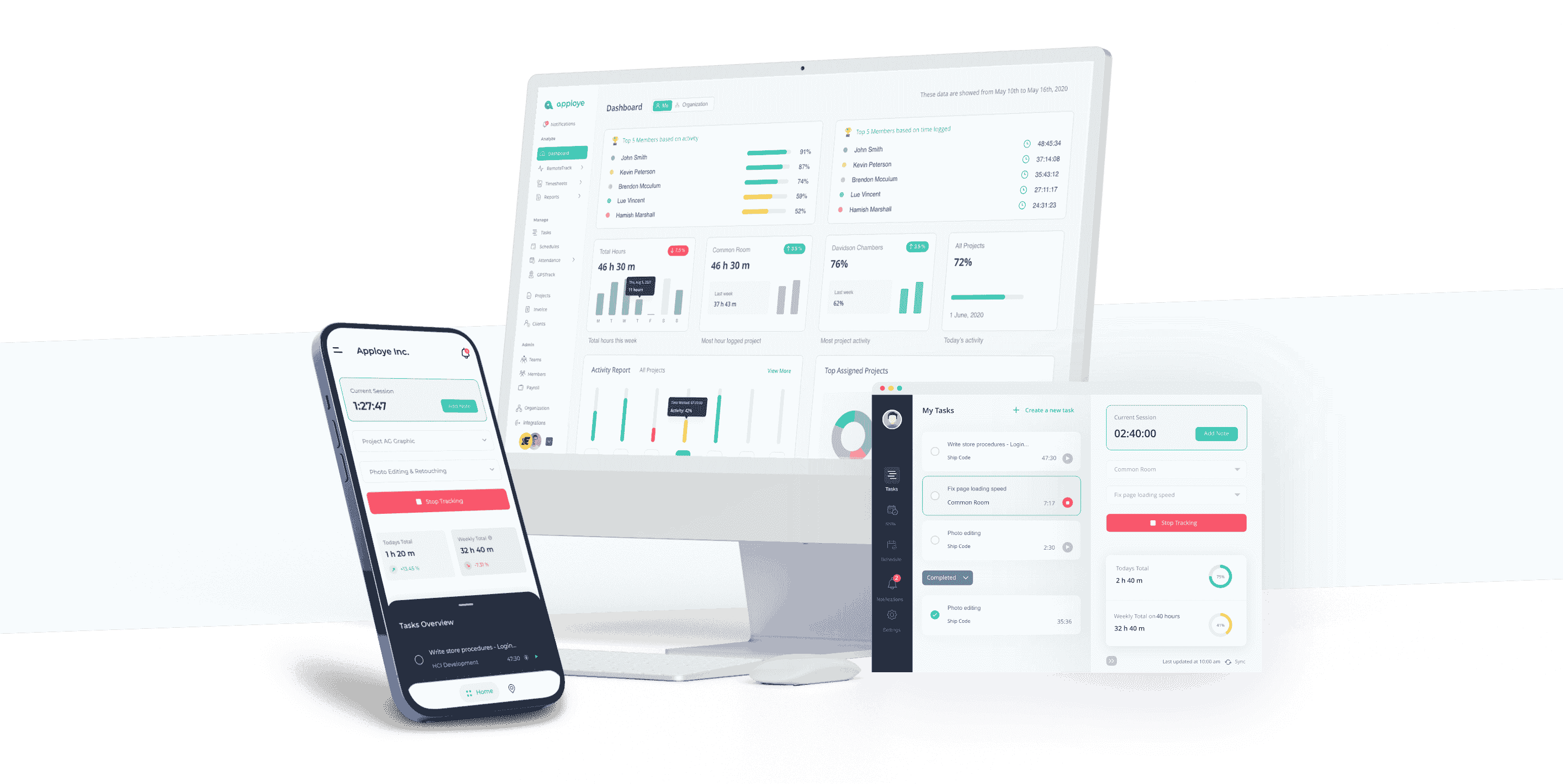
Notification and Distraction Blockers
These apps help you block your unnecessary alerts and notifications while working. They can also manage your screen time and reduce interruptions.
Encourage Healthy Work Habits
Regular Breaks
Regular breaks help the mind refresh, avoid fatigue, and improve productivity in general.
Follow the Pomodoro technique for regular breaks. Stretch every hour or take a mini walk to relieve muscle tension and increase blood circulation. Take screen-free breaks to rest your eyes.
Avoid Multitasking
Multitasking can decrease productivity, heighten errors, and give rise to mental exhaustion. To avoid this, complete one task before moving on to the next. You can schedule blocks of uninterrupted time for complex tasks.
Mindfulness and Stress Management
Mindfulness practices reduce stress levels, improve focus, and raise emotional well-being. Begin the day with breathing exercises or meditation. Review what went well during the workday and set goals for tomorrow.
Conclusion
Workplace distractions are just part of life. But they should not take all the control of your productivity and your day. The first place, to begin with, is understanding what pulls your attention away.
Start small. Tidy up your workspace, set boundaries with colleagues, and find productivity tools like Apploye that help you stay on track. It's all about making gradual changes to make it work for you.
With a little effort and the right strategies, you can control, smash your goals, and more productive day at work. You got this!

